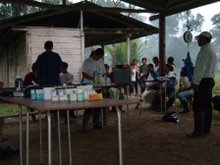With the impressive scope of the UN's Millenium Development Goals, it may seem premature to be thinking beyond these eight milestones of global improvement. But to make good on those goals, and to achieve the world vision they represent, that is precisely what needs to be done.
So what do we do after we reach the MDG's? It's 2015. 50% less people (than in 1990) live in hunger and survive on less than $1 a day. There's universal primary education available to every boy and girl in the world. Women are more empowered, mothers and babies are dying less frequently, HIV/malaria/TB infection rates are declining, governments are implementing environmentally sound policies, and the internet is now available to 30% of the world's population (up from 14%).
Have we achieved health for all?
Not yet. Because even if the above is accomplished by 2015--and the verdict is still out on whether it will be--what will those kids do with their primary education? How will women use their newly empowered social status to grow and improve? Will family planning be implemented in time to stave off the surge in population that may result from successfully battling HIV in countries like Africa and India? How will countries steeped in political/social/ethnic conflict be encouraged to collaborate for the wellbeing of their citizens? How will developed countries collaborate with developing countries? These may or may not be poignant issues in 2015, but exploring the path ahead is always useful.
Now, and in 2015, empowered women benefit from group micro-loans, whereby $300 can be invested in a community-based business that manufactures, say, peanut butter. These vendors must be given the freedom to sell their product wherever the demand is. Developing as well as developed countries must recognize the importance of free market economies and lift trade barriers--there are enough money and resources out there for anyone smart enough to figure out how to capture them. Once the MDG's are attained, and the globe is a little more flat (to borrow from Thomas Friedman), it will become increasingly true that this approach can benefit any individual or any country that adopts it.
Technical schools may be another area of focus in another ten years, when the poorest children of the world will (hopefully) be able to take primary education for granted. Literacy, math and geography are useful building blocks, but they are just that--stepping stones to learn professional or technical skills. Developing countries must have quality institutes of higher learning so that it makes sense for the new generation to continue their education in their own nations, and use their skills to build up their own people.
As people start dying less and living longer, efforts must also be made to eliminate urban sprawl and increase city planning. With the advent of the third epidemiological transition, wherein the human race is being revisited by old and new bugs, the disease burden may be doubled. One foreseeable way to limit the spread of infectious disease (apart from better sanitation, part of MDG #7) is through city planning and balancing the urban/suburban population proportions, particularly in places like China, India and Africa. MDG #7 cites improving the lives of at least 100 million slum-dwellers as an objective, yet it doesn't offer any strategies for doing it.
And what about global cooperation? That is, after all, one of the most crucial factors in closing the gap between rich and poor. Debt forgiveness, aid, new loans, incentives for innovation...the degree and quality of international participation will determine how far we can go in making health a resource that is truly available to every human being. Interestingly, it will also determine how important a player each developed nation will be in the world's future.
Sunday, January 14, 2007
Subscribe to:
Post Comments (Atom)





2 comments:
I loved your website, and I agree with what you said about empowering people and the possible confusion this may cause. As a comparison example people who are obese and have the gastric bypass surgery all of a sudden loose a ton of weight because their stomach shrinks. They eat less because they are full, but becuase they haven't changed their habits, they don't know how to eat healthy and before they know it, they gain weight again.
We don't want this to happen simililarly with the MDGS, be empowering them with rights that they may be confused about using, and potentially fall back into old habits, becuase they have not been educated properly.
I think your blog is my favorite thus far. The issues you address are so very critical including sustainable development, empowerment of women through education, debt forgiveness for developing nations, and free trade. I heard about the $100 laptop for every child in the developing world on NPR shortly after I saw the link on your blog. I think the availability of information through technology to people in the developing world will do much to uplift them and inspire them to reach for bigger things.
Post a Comment